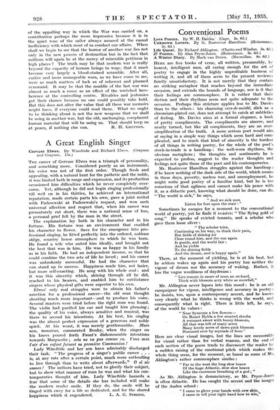A Great English Singer
Tim career of Gervase Elwes was a triumph of personality, and something more. Considered purely as an instrument, his voice was not of the first order. Though fresh and appealing, with a natural bent for the pathetic and the noble, it was limited both in range and expression, and its production occasioned him difficulties which he never completely over- came. Yet, although he did not begin singing professionally till well on in his thirties, he achieved an international reputation, made certain parts his own, gave a joint recital with Paderewski at Paderewski's request, and won such universal affection and respect that, when his career was prematurely cut short, there was a nationa) sense of loss, a personal grief felt by the man in the street.
The explanation lay both in his character and in his fortune. His fortune was an environment that enabled his character to flower. Save for the emergence into pro- fessional singing, he fitted perfectly into the ordered, noblesse oblige, country hOuse atmosphere to which he was born. He found a wife who suited him ideally, and brought out the best that was in him. He was as happy in his family as in his faith. He had an independent income, so that he could combine the two sets of life he loved ; and his career was unbrokenly successful. He had the character that can stand up to success. Happiness made him, not lazier, but more self-exacting. He sang with his whole soul : and it. was this sincerity which, shining through all he did, reached to his hearers, and - enabled him to outdistance singers whose physical gifts were superior to his own.
Elwes' only real struggles were to obtain his father's sanction for a professional career—the old man thought shooting much more important—and to produce his voice. Several masters were tried before the right man was found. The violin had purified his ear and taught him phrasing ; the quality of his voice, always sensitive and musical, was there to second his intentions. At his best, his singing was the almost perfect expression of a generous and noble spirit. At his worst, it was merely gentlemanlike. Mais non, monsieur, commented Bouhy, when the singer on his knees poured forth Faust's dishonourable intentions towards Marguerite ; cela ne va pas comme ca. Vous even Fair d'un enfant faisant sa premiere Communion !
Lady Winefride and her son have admirably discharged their task. " The progress of a singer's public career . . . is, at any rate after a certain point, much more enthralling to. live through than to write about afterwards." 0 si sic omnes ! The authors have tried, not to glorify their subject, but to show what manner of man he was and what his con- temporaries thought of him. Lady Winefride hazards a fear that some of the details she has included will make the modern reader smile. If they do, the smile will be tinged with envy for a life so dedicated, and for the shared happiness which it engendered. L. A. G. STRONG.


























































 Previous page
Previous page